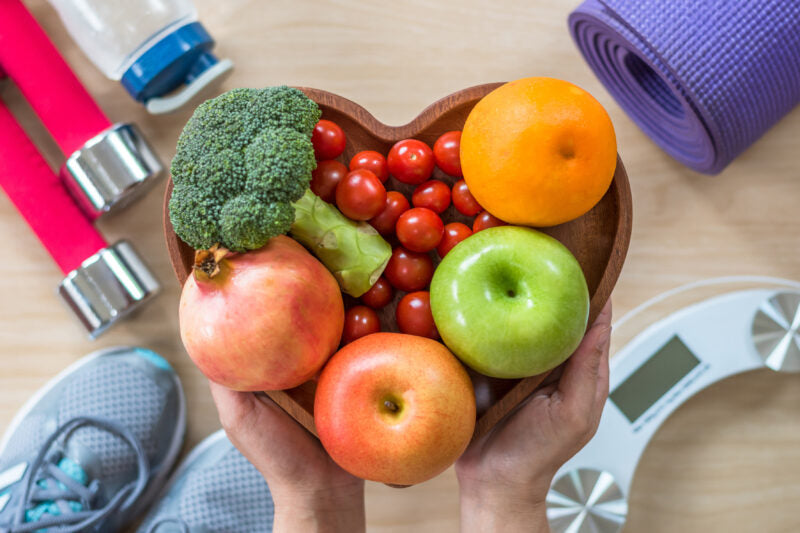There are small ways to improve your nutrition and they are easy. March is National Nutrition Month. Created by the Academy of Nutrition and Dietetics, as an opportunity to learn more about the importance of making informed food choices and developing and maintaining healthy eating and physical activity practices.
Eating a healthy diet and getting regular physical activity are key strategies to stay healthy and reduce the chance of developing many diseases. In Kansas, about 35 percent of the population is overweight and almost one-third more is obese.
Having excess weight is a risk factor for many diseases, including coronary heart disease, stroke, Type 2 diabetes, osteoarthritis, sleep apnea, several cancers, and more.
Start small by setting goals that are more likely to be successful. Then gradually work toward where you want to be. Setting achievable goals will lead to lasting change.

Here are 10 small ways you can improve your nutrition
- Keep your daily calorie intake to a reasonable amount. Find out how many calories you need for your age, gender, activity level and your personal weight goals (i.e., do you want to lose, gain or maintain your weight?). If you want to lose weight, consult your health care provider for a safe calorie goal and eating plan. Working with other certified advisers such a dietitian, fitness professional or wellness coach can help support you as you work toward your goals.
- Enjoy your food but eat less. Take time to fully enjoy what you are eating. This is called mindful eating. Eating quickly or not paying attention to what you eat, known as mindless eating, can lead to eating too many calories.
- Keep portion sizes of food to a reasonable and recommended amount. “Portion distortion” is rampant in America. To learn more about how much food to eat daily for your calorie needs, in the fruits, vegetables, protein and grains food categories, go to the supertracker website.
- Try to eat more of these foods: vegetables, fruits, whole grains, lean proteins, and some low-fat dairy products. Try to make these the basis for your meals and snacks rather than meats and other high-fat and non-nutritive foods.
- Dedicate half your plate at meals to fruits and vegetables. Fruits, vegetables (and grains) offer important vitamins, minerals and phytochemicals. Most have little fat and no cholesterol. They also contain fiber to help with digestion and prevent constipation. Research shows that eating a diet high in fruits and vegetables may help lower cholesterol and blood sugar and prevent heart disease.
- Try to make at least half (or preferably all) your daily grains whole grains. Foods made from whole grains are a major source of energy and fiber. Learn to read food labels so you can identify which grains are truly whole grains.
- Select leaner sources of protein and try to use more plant-based proteins in your meals and recipes. Protein foods include animal sources (meat, poultry, seafood, eggs and dairy products) and plant sources (beans, peas, soy products, nuts, seeds).
- Cut back on less healthy foods. These are foods high in saturated and solid (trans) fats and added sugars and salt, such as cookies, ice cream, candy, sweetened drinks, and fatty meats like bacon and hot dogs. These foods generally provide a lot of calories and minimal, if any, nutritional benefit. Have these as occasional treats but not every day.
- Reduce your sodium (salt intake). Cut down on using canned, packaged and frozen processed foods. If you are buying these items, use the Nutrition Facts label to choose lower sodium versions of foods. High-sodium restaurant meals are also another significant source of added salt to one’s diet.
- Rethink your drink. Drink more water and other unsweetened beverages, instead of sugary and other high-calorie drinks. Soda, sweetened juice, energy and sports drinks are a major source of added sugar and calories in many American diets.
These small ways to improve your nutrition will improve your health and reduce your risk of heart attack, coronary heart disease, stroke, Type 2 diabetes, osteoarthritis, sleep apnea, several cancers, and more.
For more information go to The American Heart Association (heart.org), the American Cancer Society (cancer.org), and the American Diabetes Association (diabetes.org) all have more information about eating nutritiously, plus healthy recipes on their websites.

Source: Aynsley Anderson Sosinski, MA, RN, is Community Education Coordinator at Lawrence Memorial Hospital.


